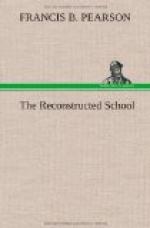The sluggard deems the sunrise an impertinence because it disturbs his morning slumber; but such a change may be wrought in him as to cause him to stand in reverence before the very thing he once condemned. The sunrise, once an affront, is now nothing less than a miracle, and he stands in the sublime presence with uncovered and lowered head. He is a reverent witness of the re-birth of the world. An hour ago there was darkness; now there is light. An hour ago the world was dead; now it is gloriously alive. An hour ago there was silence; now there is sound of such exquisite quality as to ravish the soul with delight. As the first beams of sunlight come streaming over the hills, ten thousand birds join in a mighty chorus of welcome to the newborn day and the world is flooded with song; and the whilom sluggard thrills under the spell of the scene and feels himself a part of the world that is vibrant with music. Can it be denied that this man is all the better citizen for his ability to appreciate the wonderfulness of a sunrise?
But while we extol and magnify the quality of appreciation, it is well to note that it cannot be superinduced by any imperial mandate nor does it spring into being at the behest of didacticism. It can be caught but not taught. Indeed, it is worthy of general observation that the choice things which young people receive from the schools, colleges, and normal schools are caught and not taught, however much the teachers may plume themselves upon their ability to impart instruction. Education, at its best, is a process of inoculation. The teacher is an important factor in this process of generating situations that render inoculation far more easy; and we omit one of the most vital things in education when we refer only to the teacher’s ability to “impart instruction.” The pupil gets certain things in that room, but the teacher does not give them. The teacher’s function is to create situations in which the spirit of the pupil will become inoculated with the germs of truth in all its aspects. If he could give the things that the pupils get, then all would share alike in the distribution. If the teacher could impart instruction, he certainly would not fail to lift all his pupils over the seventy-five per cent hurdle.
If instruction or knowledge could be imparted, education would no longer be a spiritual process but rather one of driving the boy into a corner, imparting such instruction as the teacher might decree and keeping on until the point of saturation was reached or the supply of instruction became exhausted, when the trick would be done. The process would be as simple as pouring water from one vessel into another. Sometimes the teacher of literature strives to engender appreciation in a pupil by rhapsodizing over some passage. She reads the passage in a frenzy of simulated enthusiasm, with a quaver in her voice and moisture in her eyes, only to find, at the end, that her patient has fallen asleep. Appreciation cannot be generated in such fashion. The boy cannot light his torch of appreciation at a mere phosphorescent glow. There must be heat behind the light or there can be no ignition. The boy senses the fictitious at once and cannot react to what he knows to be spurious. Only the genuine can win his interest.




